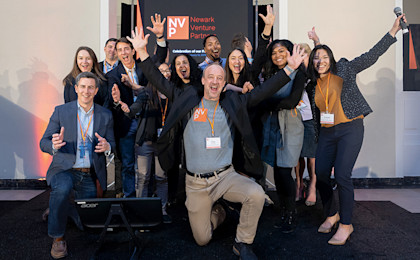“There's Something Happening in Newark, You Need to Check Out NVP”

In 2015, Audible founder and CEO Don Katz founded Newark Venture Partners (NVP), a venture fund that attracts early-stage companies to Newark to help catalyze the city’s tech ecosystem. NVP’s accelerator program, NVP Labs, helps startups quickly scale every aspect of their business and provides them with free office space (in the same building as Audible), as well as valuable connections to NVP’s corporate investors. NVP also leads select companies through further funding rounds, which is the lifeline of a startup. Audible remains dedicated to NVP’s growth—with nearly 300 Audible employees on call to coach the startups in various areas of expertise.
We checked in with the founders of three companies from past NVP Labs classes. These budding startups remain committed to Newark and aim to tackle problems in education, workplace readiness and banking.

MoCaFi
Wole Coaxum spent his career in financial services at Citigroup and JP Morgan, seeing firsthand how banks could change communities and impact peoples' lives through building credit or providing loans to start small businesses or buy homes. But he started to think more and more of the millions of Americans who operate in a cash economy, mostly low- and moderate-income communities and communities of color where brick and mortar bank branches are scarce or non-existent, inhibiting the opportunity to build credit or gain financial literacy.
Coaxum jumped into the startup world with plans of building MoCaFi, or Mobility Capital Finance. Primarily a mobile banking platform, MoCaFi offers users accounts with no minimum balance and no monthly fee, as well as physical debit cards for just $5. But it also allows users to report their rent payments, typically a cash or check transaction, to build credit.
Since participating in NVP’s three-month accelerator program in spring 2018, MoCaFi has grown from three to 10 employees and finished raising $3 million in capital. And Coaxum remains stoutly anchored to the city of Newark, where Audible's public policy team connected him with public officials, resulting in MoCaFi partnerships with community groups such as United Way and Covenant House, to provide financial literacy services to city residents. MoCaFi is still working out of NVP's space in One Washington Park and is using its partnership with Newark as a model to explore similar arrangements with other communities.

1Huddle
Sam Caucci set out to make workplace training fun and engaging after encountering an increasing number of college graduates who showed up for their first jobs woefully unprepared. Caucci took his idea of “HQ Trivia for employees” and his life savings to Silicon Valley where an investor told him, “There's something happening in Newark, you need to check out NVP.”
In the fall 2016 NVP accelerator program, Caucci says he learned to “grow in a responsible way, little by little, listening to customers.” His vision for 1Huddle also started to shift. He began to think about how the product could have greater social impact–and Caucci credits this entirely to Newark and Audible. The reality in most workplaces, he came to realize, was that the “highest paid employees get the most access to mentors, training and support” and 1Huddle's gaming technology had “the opportunity to do more” for all different levels of talent and job seekers. 1Huddle also donated its platform to Newark's workforce readiness program and the company’s employees are expected to dedicate a percentage of their working time to community projects.
Looking forward, Caucci is intent on expanding 1Huddle's games and the company is seeking out additional city and community partnerships, as well as building up the roster of companies it’s currently working with, which includes Fossil, Novartis, Madison Square Garden, ESPN and Audible's Customer Care department. Three years later, Caucci is still convinced one “can learn anything in a game.”

ClassTag
ClassTag co-founder Vlada Lotkina learned a lot when she became a parent. The management consultant already knew about problem solving from her day job, as well as from her early successes with entrepreneurial ventures in her native Ukraine. But when her daughter started school in New York City, she was struck by how outdated and fragmented parent-teacher communications were, not to mention how severely underpaid public school teachers in the U.S. are, with 94 percent of them spending $500 or more of their own money on school supplies each year.
ClassTag seeks to remedy both of these issues. First, it's a way of creating a streamlined parent-teacher communication: Teachers can send out reminders, communicate with an individual student's parents or schedule a classroom event or field trip. As for school supplies, Lotkina is proud of ClassTag's innovative approach: brand partnerships. Companies can place ads in the platform or donate branded supplies.
Lotkina says much of this model was worked out during ClassTag's time at NVP’s accelerator program, as was putting greater focus on user experience. This upcoming school year ClassTag will be used by teachers in 50,000 classrooms in all 50 states and by more than 1,500,000 teachers and parents. She still works out of the NVP offices—where female-founded companies comprise 25 percent of NVP’s portfolio—and says she is grateful to be around other startups going through similar challenges. “Every entrepreneur goes through battle on a daily basis, and knowing you're not alone, that it happens to others, is so reassuring.”

